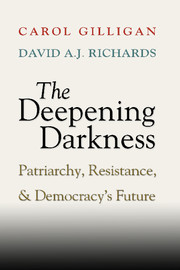Book contents
- Frontmatter
- Contents
- Acknowledgments
- Introduction and Overview
- Part One Roman Patriarchy: Entering the Darkness
- 1 Why Rome? Why Now?
- 2 Roman Patriarchy and Violence
- 3 Vergil on the Darkness Visible
- 4 Apuleius on Conversion
- 5 Augustine on Conversion
- Part Two Resistance Across Time and Culture
- Part Three Democracy's Future
- Conclusion
- Notes
- Bibliography
- Index
2 - Roman Patriarchy and Violence
Published online by Cambridge University Press: 01 September 2010
- Frontmatter
- Contents
- Acknowledgments
- Introduction and Overview
- Part One Roman Patriarchy: Entering the Darkness
- 1 Why Rome? Why Now?
- 2 Roman Patriarchy and Violence
- 3 Vergil on the Darkness Visible
- 4 Apuleius on Conversion
- 5 Augustine on Conversion
- Part Two Resistance Across Time and Culture
- Part Three Democracy's Future
- Conclusion
- Notes
- Bibliography
- Index
Summary
There are two important strands in the historical literature on ancient Rome. First is the literature on the public political and military life of Rome, which started as a small city-state under the rule of elected kings and turned upon their expulsion into a form of aristocratic republic that aggressively expanded over the next four centuries to rule the entire Mediterranean basin and much more. Its success led to civil wars that discredited republican government, making possible the transition under Augustus to what Roman republicans traditionally despised, the rule of kings, to wit, autocratic imperial rule that was to endure for yet another 400 years. Its decline was given a still classical statement in Gibbon's masterpiece, The Decline and Fall of the Roman Empire. Second is the more recent literature on the Roman family. These two literatures, with a few notable exceptions, exist largely in isolation from one another: that on public life written largely by men, that on family life largely by women. We find a link between these two literatures in the concept central to our inquiry, patriarchy.
Patriarchy is an anthropological term denoting families or societies ruled by fathers. It sets up a hierarchy – a rule of priests – in which the priest, the hieros, is a father, pater. As an order of living, it elevates some men over other men and all men over women; within the family, it separates fathers from sons (the men from the boys) and places both women and children under a father's authority.
- Type
- Chapter
- Information
- The Deepening DarknessPatriarchy, Resistance, and Democracy's Future, pp. 22 - 52Publisher: Cambridge University PressPrint publication year: 2008



